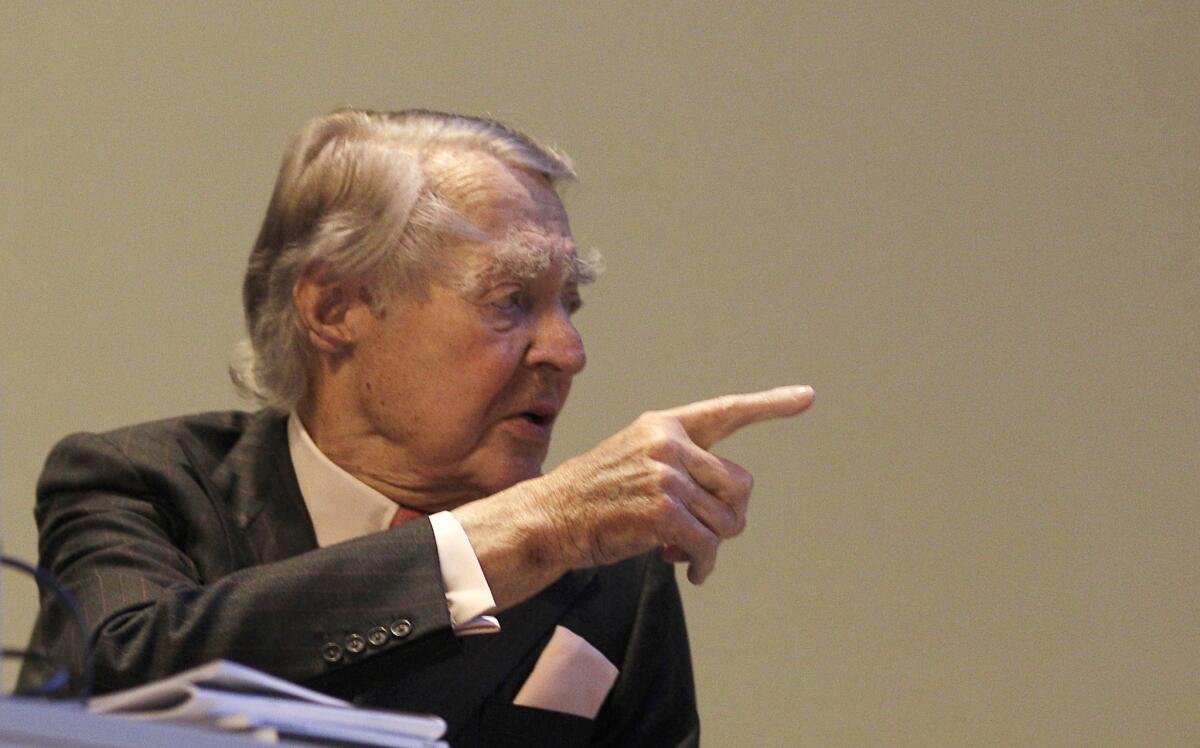PASSINGS: Berthold Beitz, William Warren Scranton, Peter M. Flanigan

Berthold Beitz
Industrialist honored for
saving Jews during WWII
Berthold Beitz, 99, who was honored for saving hundreds of Jews in occupied Poland during World War II and became one of postwar West Germany’s leading industrialists, died Tuesday. Steelmaker ThyssenKrupp, where he was the honorary chairman of the supervisory board, announced his death but gave no further details.
Beitz and his wife, Else, were honored by Germany’s main Jewish group in 2000 for saving hundreds of Jewish workers at an oil field he managed in occupied Poland from deportation to Nazi death camps.
In 1973, Beitz was given the Righteous Among the Nations honorific by the Israeli Yad Vashem Holocaust Museum — the highest honor given to a Gentile, or non-Jew, for saving Jews.
He also played a role in world sports as a member of the International Olympic Committee from 1972 to 1988, the last four years as an IOC vice president.
Beitz was born Sept. 26, 1913, in Zemmin in eastern Germany. He studied to become a banker and took a position at an oil field in occupied Poland in 1939.
He saved many of the Jewish workers there from the Nazis’ death camps, sometimes by hiding them at his home. He and his wife had three daughters.
In August 1942, he saved 250 Jews from being deported to the Belzec death camp by claiming they were indispensable to keep up production. Asked after the end of the Third Reich about his personal motivation, Beitz said, according to Yad Vashem, “There was no anti-Fascism, no resistance. We watched from morning to evening as close as you can get what was happening to the Jews. … When you see a woman with her child in her arms being shot, and you yourself have a child, then your response is bound to be completely different.”
In the 1950s, Beitz agreed to administer the Krupp steel company, which was heavily involved in armaments production during the war. He headed the company in various positions for about 60 years.
William Warren Scranton
Former governor
of Pennsylvania
William Warren Scranton, 96, a former Pennsylvania governor, presidential candidate and ambassador to the United Nations, died of a cerebral hemorrhage Sunday at a retirement community in Montecito where he lived with his wife, a family spokesman said.
Scranton, a progressive Republican from the northeastern Pennsylvania city named after his wealthy family, was elected to Congress in 1960. He served one term before he was elected as Pennsylvania’s 38th governor in 1962.
His foray into presidential politics occurred in 1964, during his one term as governor, when he emerged as a moderately liberal alternative to conservative Arizona Sen. Barry Goldwater after New York Gov. Nelson A. Rockefeller dropped out of the race.
Scranton said that he ran because he thought “someone had to oppose Goldwater,” but that he knew he didn’t have a chance.
He committed to the race barely a month before the Republican convention but lost the nomination by a 4-1 margin after a hoped-for endorsement from former President Dwight Eisenhower failed to materialize. In the general election, Goldwater lost to President Lyndon B. Johnson by a landslide.
A popular governor skilled in public relations, Scranton took advantage of a strong economy to reform the Pennsylvania Civil Service, double spending on education and increase the state sales tax to 5% from 4%. He also oversaw the creation of the state’s community-college system and the Pennsylvania Higher Education Assistance Agency, now a national provider of student financial aid services. State spending increased 38% during his administration.
Scranton, whose ancestors accumulated vast holdings in iron, coal and railroads during the 19th century, was appointed ambassador to the United Nations in 1976 by President Gerald Ford. He served about 10 months in the post.
Scranton was born July 19, 1917, in Madison, Conn., where his family had a summer home. His mother was a Republican National Committee member from 1928 to 1953, and in the early 1940s was the party’s national vice chairwoman. By the time he was 9, young Bill Scranton was counting vote totals on election nights.
He attended Yale University, graduating with a bachelor’s degree in 1939 after studying history. He served in the Army Air Forces during World War II then returned to Yale for his law degree.
Peter M. Flanigan
Manager of Nixon’s 1968
presidential campaign
Peter M. Flanigan, 90, an investment banker who helped Richard Nixon become president and served in his administration as an advisor on business and the economy, died Monday at a hospital outside Salzburg, Austria, said his daughter, Megan Flanigan. She declined to give a cause. He had been splitting his time between homes in Austria and Purchase, N.Y.
After working as deputy campaign manager for Nixon’s successful 1968 presidential run, Flanigan served as an unpaid consultant in filling top executive branch appointments. He then joined the White House staff as assistant to the president, focusing on economic and financial matters. In 1972 he was named assistant for international economic affairs.
Time magazine, in a 1972 article, called Flanigan “Nixon’s ‘Mr. Fixit’ when it comes to powerful business interests.”
Flanigan resigned from the administration in June 1974 and returned to work at investment bank Dillon, Read & Co. He retired in 1992.
Peter Magnus Flanigan was born June 21, 1923, in New York. He served in the U.S. Navy as a carrier pilot during World War II, graduated from Princeton University in 1947, and joined Dillon, Read as a statistical analyst.
Times staff and wire reports
More to Read
Start your day right
Sign up for Essential California for the L.A. Times biggest news, features and recommendations in your inbox six days a week.
You may occasionally receive promotional content from the Los Angeles Times.




